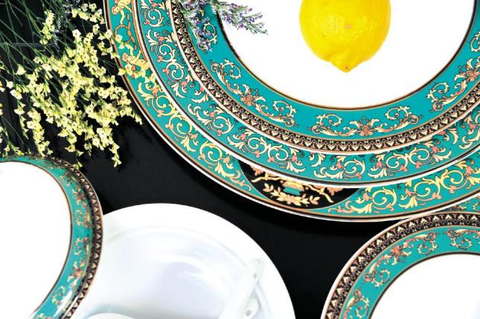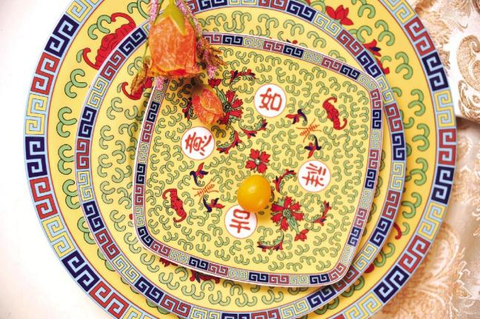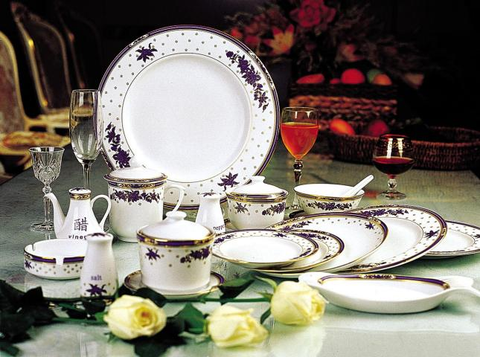The "7501 Project" – Jingdezhen’s Porcelain for Zhongnanhai
In the world of porcelain, Jingdezhen is a name synonymous with excellence and tradition. The relationship between Jingdezhen porcelain and China’s political and cultural symbolism began with projects like the "7501 Project". In 1975, Jingdezhen was tasked with producing exclusive porcelain for Zhongnanhai, the central government complex in Beijing, where top Chinese leaders reside and work. Locals affectionately dubbed this assignment as the "7501 Project."
This collection of high-white porcelain represented the pinnacle of Chinese porcelain craftsmanship at the time. The porcelain was delicate yet durable, featuring hand-painted designs of plum blossoms and peach flowers—both personal favorites of Chairman Mao. Known for its crystal-clear finish, smooth texture, and flawless craftsmanship, the "7501" porcelain was the epitome of elegance, reserved exclusively for high-ranking officials.
A Symbol of China’s Artistry and Diplomacy
Jingdezhen porcelain, particularly pieces like those produced for the "7501 Project," became an important tool for China’s cultural diplomacy. Over the years, Jingdezhen has created over 300 batches of gift porcelain for Chinese leaders to present during foreign visits. These porcelain gifts reflect China’s long-standing history, as well as the skills and artistic capabilities of its craftsmen.
At JDZPorcelain.com, you can find high-quality porcelain items that mirror the artistic excellence of projects like the "7501 Project." For example, the "Plum Blossom High-White Vase" offers collectors a modern take on the classic motifs favored in Zhongnanhai porcelain, with intricate hand-painted details and the same smooth, high-quality finish.
Jingdezhen’s Struggles and Rebirth in the 1990s
Despite its prestigious history, Jingdezhen’s porcelain industry faced significant challenges in the 1990s. Structural reforms in the Chinese economy, coupled with increased competition from emerging porcelain-producing regions, put a strain on the local industry. Many state-owned enterprises in Jingdezhen were operating at a loss, and it seemed that the once-glorious porcelain capital was falling behind.
However, in 1996, the local government initiated an ambitious revitalization plan, implementing policies to restructure the porcelain industry. New production lines were built, and efforts were made to modernize manufacturing techniques without compromising the traditional craftsmanship for which Jingdezhen was famous. This move marked a turning point for Jingdezhen, positioning it once again as a leader in high-end daily-use porcelain.
One of the significant results of this restructuring was the creation of Jingdezhen Porcelain Co., Ltd., a modern entity that blended centuries-old techniques with state-of-the-art technology to produce world-class porcelain.
The APEC Conference: Jingdezhen’s Global Showcase
A crowning achievement for Jingdezhen came in 2001 when it was selected as the official porcelain provider for the APEC Conference held in Shanghai. This was no small feat, as it meant that Jingdezhen’s porcelain would be showcased to world leaders and dignitaries from across the globe.
Jingdezhen Porcelain Co., Ltd. created three different sets of Western-style porcelain for the event, blending traditional Chinese artistry with international aesthetics. The sets featured rich designs of green and gold peonies and blue and gold peonies, symbolizing prosperity and elegance. These porcelain sets were not only used during the conference but also sold as APEC commemorative porcelain, fetching as much as $800 per set at the time.
The APEC Conference marked a significant moment for Jingdezhen, as it reaffirmed its position as a global leader in porcelain production. It also showed how adaptable Jingdezhen porcelain could be, moving seamlessly from traditional Chinese designs to more modern, internationally appealing styles.
At JDZPorcelain.com, you can explore similar APEC-style porcelain collections, including luxury dinnerware that blends international design with traditional Chinese elements, perfect for both special occasions and everyday use.
The Role of Jingdezhen Porcelain in China’s Cultural Identity
Jingdezhen porcelain is much more than just beautiful tableware or decorative art; it is a symbol of China’s cultural identity. The phrase "China" is not only the name of the country but also a term for fine ceramics, illustrating how deeply intertwined porcelain is with China’s history and global image.
From ancient times through modern-day diplomacy, Jingdezhen porcelain has represented China on the international stage. Whether it’s the "7501 Project" porcelain in Zhongnanhai or the APEC porcelain admired by global leaders, these pieces carry with them the weight of history and tradition.
Jingdezhen porcelain continues to play a crucial role in shaping China’s image. Owning a piece of this high-end porcelain is not just about acquiring a beautiful object—it’s about connecting with centuries of artistry and craftsmanship. This is why collectors and enthusiasts from around the world continue to seek out Jingdezhen porcelain today.
Experience Jingdezhen Porcelain at JDZPorcelain.com
If you’re looking to own a piece of this rich history, JDZPorcelain.com offers a wide range of Jingdezhen porcelain products that reflect the craftsmanship and heritage that made APEC porcelain and the "7501 Project" so iconic.
For example, the "Lotus and Crane Dinnerware Set" is an excellent choice for those who appreciate traditional Chinese motifs with modern elegance. This set, like the APEC porcelain, combines beauty with functionality, making it perfect for both everyday dining and special occasions.
Another standout item is the "Blue and White Landscape Vase", which captures the essence of Jingdezhen’s legacy. Hand-painted with intricate details, this vase serves as both a decorative centerpiece and a reminder of the timeless artistry that defines Jingdezhen porcelain.
FAQs About Jingdezhen Porcelain
Why is Jingdezhen called the "Porcelain Capital"?
Jingdezhen has been producing porcelain for over 1,700 years and has perfected techniques that have made it renowned worldwide. Its high-quality materials, innovative designs, and unmatched craftsmanship have earned it the title of the "Porcelain Capital."
What was the "7501 Project"?
The "7501 Project" was a special task given to Jingdezhen in 1975 to produce exclusive high-white porcelain for Zhongnanhai, China’s central government complex. It represented the height of porcelain craftsmanship at the time and was used by top Chinese leaders.
What makes APEC porcelain so special?
APEC porcelain was designed specifically for the 2001 APEC Conference in Shanghai. Jingdezhen Porcelain Co., Ltd. produced three different sets that blended Chinese tradition with international design, making it a symbol of modern cultural diplomacy.
How has Jingdezhen porcelain adapted to modern markets?
While maintaining its traditional techniques, Jingdezhen porcelain has embraced modern designs and production methods to appeal to both domestic and international markets, as seen in its APEC porcelain and modern dinnerware sets available on JDZPorcelain.com.
Where can I buy authentic Jingdezhen porcelain?
You can find a wide selection of authentic Jingdezhen porcelain at JDZPorcelain.com, where you’ll discover everything from traditional vases to modern dinnerware sets.
Conclusion: Jingdezhen Porcelain – A Timeless Legacy
From the "7501 Project" to APEC porcelain, Jingdezhen has continuously proven itself as the global leader in porcelain craftsmanship. Today, this tradition lives on through collections available at JDZPorcelain.com, where you can experience the beauty and cultural significance of Jingdezhen porcelain for yourself. Whether for personal use or as a unique gift, owning Jingdezhen porcelain is a way to connect with China’s rich heritage and its world-class artistry.



